|
|
|
Sort Order |
|
|
|
Items / Page
|
|
|
|
|
|
|
| Srl | Item |
| 1 |
ID:
138344
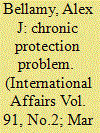

|
|
|
|
|
| Summary/Abstract |
The Democratic Peoples' Republic of Korea (DPRK) is arguably the world's most chronic abuser of human rights. In an unprecedented move, a Commission of Inquiry established by the UN's Human Rights Council accused the DPRK government of systematic violations of human rights amounting to crimes against humanity. In so doing, the Commission succeeded in putting human rights in the DPRK on the global agenda. Within months the UN's General Assembly and Security Council had joined the human rights body in examining the issue. This article explains the emergence of this new engagement with human rights in the DPRK, showing its relation to the ‘Responsibility to Protect’ principle. It charts the growing sense of frustration felt at the lack of progress on human rights in DPRK and shows how this was manifested in the General Assembly's decision to pursue the Commission's recommendations and call on the Security Council to take concrete steps. Despite this, however, the article shows that there are powerful obstacles in the way of a more robust international approach to human rights in the DPRK and counsels a less confrontational approach focused on engaging China and building trust within the Security Council.
|
|
|
|
|
|
|
|
|
|
|
|
|
|
|
|
| 2 |
ID:
138351
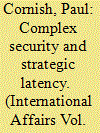

|
|
|
|
|
| Summary/Abstract |
Whichever party or parties form the next UK government, a Strategic Defence and Security Review (SDSR) is expected to begin soon after the general election in May. The review might be a ‘light touch’ exercise—little more than a reaffirmation of the SDSR produced by the coalition government in 2010. It seems more likely, however, that the review will be a lengthier, more deliberate exercise and one which might even last into 2016. For those most closely engaged in the process the challenge is more complex than that confronted by their predecessors in 2010. The international security context is more confused and contradictory; the UK's financial predicament is still grave; security threats and challenges will emerge that cannot be ignored; the population's appetite for foreign military engagement appears nevertheless to be restricted; and prevailing conditions suggest that the risk-based approach to national strategy might be proving difficult to sustain. Two key questions should be asked of the review. First, in the light of recent military experiences, what is the purpose of the United Kingdom's armed forces? Second, will SDSR 2015–16 sustain the risk-based approach to national strategy set out in 2010, and if so how convincingly? Beginning with a review of the background against which SDSR 2015–16 will be prepared, this article examines both enduring and immediate challenges to the national strategic process in the United Kingdom and concludes by arguing for strategic latency as a conceptual device which can complement, if not reinvigorate, the risk-based approach to national strategy and defence.
|
|
|
|
|
|
|
|
|
|
|
|
|
|
|
|
| 3 |
ID:
138346
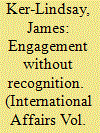

|
|
|
|
|
| Summary/Abstract |
This article examines the extent to which states are able to interact at an official level with a contested or de facto state—a state that has unilaterally declared independence but is not a member of the United Nations—without being understood to have recognized it. This is an area of increasing interest and relevance to policy-makers as the number of contested states has grown in recent years. In many cases, interaction may be important for ongoing peace efforts. However, there are also instances when a state is prevented from recognizing the territory in question for specific domestic or foreign policy reasons and so has to find alternative means by which to cooperate. Drawing on several key examples, notably Kosovo and the ‘Turkish Republic of Northern Cyprus’, but also with reference to Abkhazia, the article explores the limits of interaction across various different forms of bilateral and multilateral diplomatic activity. As is shown, albeit with some significant provisos, legal theory and historic practice suggest that diplomatic engagement does not constitute recognition if there is no underlying intent to recognize. This means that there is in fact a very high degree of latitude regarding the limits of diplomatic engagement with contested states. This is especially the case in bilateral contexts. Indeed, in some circumstances, the level of engagement can even amount to recognition in all but name.
|
|
|
|
|
|
|
|
|
|
|
|
|
|
|
|
| 4 |
ID:
138352


|
|
|
|
|
| Summary/Abstract |
This article argues that there has been an increasing convergence of the discourses of terrorism, radicalization and, more lately, extremism in the UK and that this has caused counterterrorism to lose its focus. This is particularly evident in the counterterrorism emphasis on non-violent but extremist ideology that is said to be ‘conducive’ to terrorism. Yet, terrorism is ineluctably about violence or the threat of violence; hence, if a non-violent ideology is in and of itself culpable for terrorism in some way then it ceases to be non-violent. The article argues that there should be a clearer distinction made between (non-violent) extremism of thought and extremism of method because it is surely violence and the threat of violence (integral to terrorism) that should be the focus of counterterrorism. The concern is that counterterrorism has gone beyond its remit of countering terrorism and has ventured into the broader realm of tackling ideological threats to the state.
|
|
|
|
|
|
|
|
|
|
|
|
|
|
|
|
| 5 |
ID:
138350
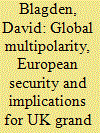

|
|
|
|
|
| Summary/Abstract |
The international system is returning to multipolarity—a situation of multiple Great Powers—drawing the post-Cold War ‘unipolar moment’ of comprehensive US political, economic and military dominance to an end. The rise of new Great Powers, namely the ‘BRICs’—Brazil, Russia, India, and most importantly, China—and the return of multipolarity at the global level in turn carries security implications for western Europe. While peaceful political relations within the European Union have attained a remarkable level of strategic, institutional and normative embeddedness, there are five factors associated with a return of Great Power competition in the wider world that may negatively impact on the western European strategic environment: the resurgence of an increasingly belligerent Russia; the erosion of the US military commitment to Europe; the risk of international military crises with the potential to embroil European states; the elevated incentive for states to acquire nuclear weapons; and the vulnerability of economically vital European sea lines and supply chains. These five factors must, in turn, be reflected in European states’ strategic behaviour. In particular, for the United Kingdom—one of western Europe's two principal military powers, and its only insular (offshore) power—the return of Great Power competition at the global level suggests that a return to offshore balancing would be a more appropriate choice than an ongoing commitment to direct military interventions of the kind that have characterized post-2001 British strategy.
|
|
|
|
|
|
|
|
|
|
|
|
|
|
|
|
| 6 |
ID:
138349
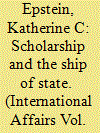

|
|
|
|
|
| Summary/Abstract |
This article uses the centenary of the First World War as an opportunity to re-examine a major element of the existing literature on the war—the strategic implications of supposed British decline—as well as analogies to the contemporary United States based upon that interpretation of history. It argues that the standard declinist interpretation of British strategy rests to a surprising degree upon the work of the naval historian Arthur Marder, and that Marder's archival research and conceptual framework were weaker than is generally realized. It suggests that more recent work appearing since Marder is stronger and renders the declinist strategic interpretation difficult to maintain. It concludes by considering the implications of this new work for analogies between the United States today and First World War-era Britain, and for the use of history in contemporary policy debates.
|
|
|
|
|
|
|
|
|
|
|
|
|
|
|
|
| 7 |
ID:
138345


|
|
|
|
|
| Summary/Abstract |
As China has grown stronger, some observers have identified an assertive turn in Chinese foreign policy. Evidence to support this argument includes the increasingly frequent evocation of China's ‘core interests’—a set of interests that represents the non-negotiable bottom lines of Chinese foreign policy. When new concepts, ideas and political agendas are introduced in China, there is seldom a shared understanding of how they should be defined; the process of populating the concept with real meaning often takes place incrementally. This, the article argues, is what has happened with the notion of core interests. While there are some agreed bottom lines, what issues deserve to be defined (and thus protected) as core interests remains somewhat blurred and open to question. By using content analysis to study 108 articles by Chinese scholars, this article analyses Chinese academic discourse of China's core interests. The authors’ main finding is that ‘core interests’ is a vague concept in the Chinese discourse, despite its increasing use by the government to legitimize its diplomatic actions and claims. The article argues that this vagueness not only makes it difficult to predict Chinese diplomatic behaviour on key issues, but also allows external observers a rich source of opinions to select from to help support pre-existing views on the nature of China as a global power.
|
|
|
|
|
|
|
|
|
|
|
|
|
|
|
|
| 8 |
ID:
138348


|
|
|
|
|
| Summary/Abstract |
This article scrutinizes the merits of holding a referendum over UK membership of the EU. It queries the assumption that direct democracy can somehow resolve the longstanding Europe question in British politics. To do this, the analysis traces the existence of an exceptionalist approach to the EU within Britain, now associated with re-negotiating UK membership in the shadow of a referendum. The article argues that the prospects for a radical reconfiguration of the UK's treaty obligations are slim, thereby increasing the risk of a vote to withdraw. Yet withdrawal would be the opposite of a simple solution to the Europe question. Political and economic interests dictate lengthy politicking over a highly complex post-Brexit settlement revisiting free movement of goods, services, capital and people. Such negotiations undermine any mooted cathartic benefits of a popular vote, while Eurosceptics will remain dissatisfied in the event of a yes, a result likely to further destabilize the Conservative Party. Consequently, the simplicity and decisiveness that a referendum—particularly one that spurns the EU—promises is merely a mirage as relations with the EU necessarily form part of an enduring British political conversation.
|
|
|
|
|
|
|
|
|
|
|
|
|
|
|
|
| 9 |
ID:
138347
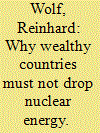

|
|
|
|
|
| Summary/Abstract |
Current estimates indicate that several hundred thousand deaths per year can be attributed to climate change. Developed countries have reacted to this growing disaster by increasing the use of renewable energies, but what is to be done with the additional electricity thus generated? Should it be used for cutting back coal-fired energy production or can it be used for substituting nuclear energy? Priority must be given to replacing coal power, since developed countries have a strong duty to minimize the physical harm caused by their electricity generation. Dropping nuclear energy prior to coal power cannot be justified because the risks of nuclear energy pale in comparison to the suffering that emissions from coal-fired plants inflict both on their host countries and on poorer countries in the global South that (a) do not benefit from this energy and (b) have far less capacity to cope with the effects of climate change or other environmental damages. This article argues that when faced with a choice between operating coal-fired power plants or nuclear reactors, governments are obliged to opt for nuclear energy.
|
|
|
|
|
|
|
|
|
|
|
|
|
|
|
|
|
|
|
|
|